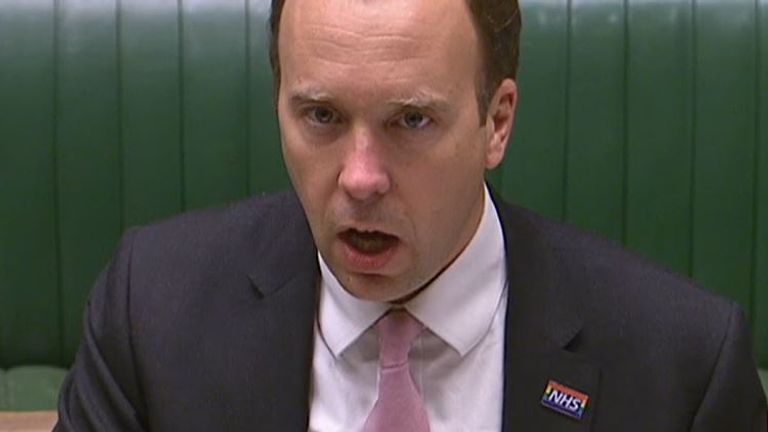Coronavirus: Hospital warns of operation cancellations if COVID-19 cases continue to rise
The sense of relief is palpable. Especially if you’re a patient and have been waiting months to get treatment.
“The hospital takes your temperature before you come in and it’s all cleansed, so I had no fear at all,” said Serena Butler just after she had an MRI scan on her elbow.
Ms Butler is in a lot of pain and her doctor had no trouble in making an appointment to come to the radiology department at Horton General Hospital in Banbury, Oxfordshire.
But if Ms Butler had been suffering the same pain in April or May she would have just have had to live with the agony.
Halton hospital resumed its non-emergency treatments in June after suspending them in April and May to cope with the coronavirus pandemic.
But the relief expressed by patients is shared by staff at the hospital.
Healthcare workers are healers who have devoted their lives to treating the sick. So seeing patients return to hospital waiting rooms after months of absence has made them feel hopeful again.
Diane Duret, the principal radiographer in charge of Ms Butler’s MRI scan, could hardly contain her joy at receiving patients again.
“It’s so important to us our patients are safe,” she said. “We want our patients to come. We’re here, we are open for business.”
But the sharp rise in infections, especially here in England’s North West where I have been for the past week, threatens to disrupt services again. If it happens it will be a hammer blow.
Through the pandemic I have spoken to numerous healthcare workers about the decision to suspend elective procedures.
All have said the same thing: That we didn’t fully understand what was coming our way; that we had to protect our health service; and that we had to build capacity in the NHS.
And all of the people who I have interviewed have also said it must never be allowed to happen again.
The likely impact of cancelling operations might never be fully understood. But we know it’s going to be damaging and the after effects will be felt for years to come.
The medical Colleges are particularly strong on this. They want to see COVID-safe spaces to be designated to carry on with routine diagnostics and procedures.
That is why I was so surprised to hear an honest, perhaps brutally honest assessment from Daniel Moore, interim chief operating officer for Warrington and Halton Teaching Hospitals NHS Foundation Trust, who told me “some really difficult decisions” will have to be taken in the following days and weeks.
The rising infections are putting real pressure on his hospitals. They have 72 COVID positive patients on their wards with 12 more in the intensive care unit.
At Easter weekend, the peak of the pandemic, they had 124 COVID-19 inpatients, with 22 of these in ICU. Over the next few days the two sets of figures will narrow.
This time the key difference is back then non-emergency treatment had been stopped. That allowed staff to be redeployed and wards to be repurposed. This time the trust is treating COVID and non-COVID patients at the same time.
The Halton hospital is COVID-safe. The Trust is fortunate that it has a separate site that it can protect from infection.
But a hospital is only as good as its healthcare workers. With a rising number of COVID admissions the Trust’s Human Resources are going to be stretched again.
:: Subscribe to the Daily podcast on Apple Podcasts, Google Podcasts, Spotify, Spreaker
“We absolutely we recognise the length of time some patients have been waiting on those waiting lists,” Mr Moore said.
“We will continue through all our planning to ensure that we keep those going as long as we possibly can.”
This will allay some patient concerns, but Mr Moore stressed all decisions will have to be taken in the context of the rising infection figures.
“But we do need to be mindful,” he said. “There may come a point when we need to make some really difficult decisions around those services.”
The warning is clear. If the hospital is in danger of being overwhelmed then non-emergency treatments will have to be paused again.
That will be devastating. Not just for the patients who need treatment but also for the staff who want to treat them.
Source: Read Full Article



